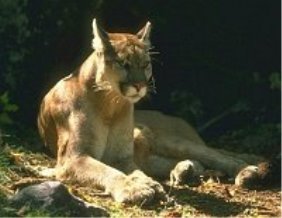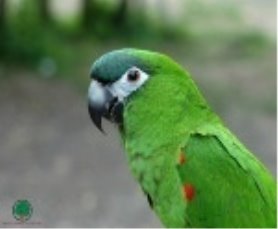Збірка англомовних пісень “Have Fun with Singing” з розробками практичних завдань та методичними рекомендаціями
Збірник англійських пісень «Have Fun with Singing» (Наталія Подзерка, Олена Кашеварова, Юлія Тонконог) складається з двох розділів: пісні для використання на початковому(Songs for Primary School) та середньому(Songs for Senior School) етапах навчання англійської мови.
Мета збірника – практичне оволодіння англійською мовою за допомогою пісенного матеріалу. Пісні, запропоновані у збірнику, можна використовувати з метою кращого закріплення граматичного матеріалу, розширення лексичного запасу, активізації вмінь та навичок усного мовлення і читання, як фонетичну зарядку, фізкультхвилинку, або просто для ігри, задоволення чи релаксації.
Ми пропонуємо наступну методику роботи з піснею на уроці, яка включає такі етапи:
1. Підготовчий етап (Pre-Listening Activity) – створення іншомовної атмосфери, кратка розповідь про співака або історію виникнення пісні, первинне прослуховування пісні.
2. Робота з текстом пісні (While-Listening Activity) – викладач пропонує різноманітні завдання для опрацювання тексту пісні, виходячи з мети уроку. Пропонується багаторазове прослуховування, що сприяє як засвоєнню лексики, так і мелодії.
3. Етап формування та вдосконалення мовленнєвих вмінь і навичок (Post-Listening Activity) – після обговорення і виконання певних завдань, виконується серія комунікативних вправ, що базується на мовному матеріалі пісні.
Автори збірника переконані, що використання пісенного матеріалу в процесі навчання іноземної мови є ефективним методом розвитку сприйняття мовлення на слух, удосконалення англійської вимови, активізації граматичних конструкцій, а також це чудовий засіб кращого засвоєння та поповнення лексичного запасу учнів. Пісня стимулює монологічне та діалогічне мовлення, сприяє розвитку як підготовленого, так і спонтанного мовлення. Крім того, пісні створюють сприятливий психологічний клімат, знижують психологічне навантаження, підтримують інтерес до вивчення іноземної мови, сприяють формуванню комунікативної та соціокультурної компетентності.
Даний збірник призначений для вчителів англійської мови та учнів загальноосвітніх шкіл.
Методичний кабінет
Артемівської міської ради
Донецької області
Збірка англомовних пісень
“Have Fun with Singing”
з розробками практичних завдань
та методичними рекомендаціями



Збірник англійських пісень «Have Fun with Singing» (Наталія Подзерка, Олена Кашеварова, Юлія Тонконог) складається з двох розділів: пісні для використання на початковому(Songs for Primary School) та середньому(Songs for Senior School) етапах навчання англійської мови.
Мета збірника – практичне оволодіння англійською мовою за допомогою пісенного матеріалу. Пісні, запропоновані у збірнику, можна використовувати з метою кращого закріплення граматичного матеріалу, розширення лексичного запасу, активізації вмінь та навичок усного мовлення і читання, як фонетичну зарядку, фізкультхвилинку, або просто для ігри, задоволення чи релаксації.
Ми пропонуємо наступну методику роботи з піснею на уроці, яка включає такі етапи:
1. Підготовчий етап (Pre-Listening Activity) – створення іншомовної атмосфери, кратка розповідь про співака або історію виникнення пісні, первинне прослуховування пісні.
2. Робота з текстом пісні (While-Listening Activity) – викладач пропонує різноманітні завдання для опрацювання тексту пісні, виходячи з мети уроку. Пропонується багаторазове прослуховування, що сприяє як засвоєнню лексики, так і мелодії.
3. Етап формування та вдосконалення мовленнєвих вмінь і навичок (Post-Listening Activity) – після обговорення і виконання певних завдань, виконується серія комунікативних вправ, що базується на мовному матеріалі пісні.
Автори збірника переконані, що використання пісенного матеріалу в процесі навчання іноземної мови є ефективним методом розвитку сприйняття мовлення на слух, удосконалення англійської вимови, активізації граматичних конструкцій, а також це чудовий засіб кращого засвоєння та поповнення лексичного запасу учнів. Пісня стимулює монологічне та діалогічне мовлення, сприяє розвитку як підготовленого, так і спонтанного мовлення. Крім того, пісні створюють сприятливий психологічний клімат, знижують психологічне навантаження, підтримують інтерес до вивчення іноземної мови, сприяють формуванню комунікативної та соціокультурної компетентності.
Даний збірник призначений для вчителів англійської мови та учнів загальноосвітніх шкіл.
Content:
I. Introduction.
II. Songs for Primary School.
1. Old MacDonald Had a Farm.
2. Old MacDonald Had a Zoo.
3. Five little ducks.
4. The Wheels on the Bus.
5. Three little kittens.
6. How are you?
7. Bingo.
8. I bought a pretty cat.
9. The Hockey-Pokey Song.
10. Welcome to Duloc.
III. Songs for Senior School.
1. Last Christmas
2. Yesterday (The Beatles)
3. Mama ( sung by Kelly family)
4. Show Must Go On (Queen)
5. Bob Marley - Dont Worry, Be Happy
6. Hakuna Matata
7. Jack and Jill
8.The Earth Song (sung by Michael Jackson)
9. London Bridge Is Falling Down
10. My Bonnie
11. Happy New Year
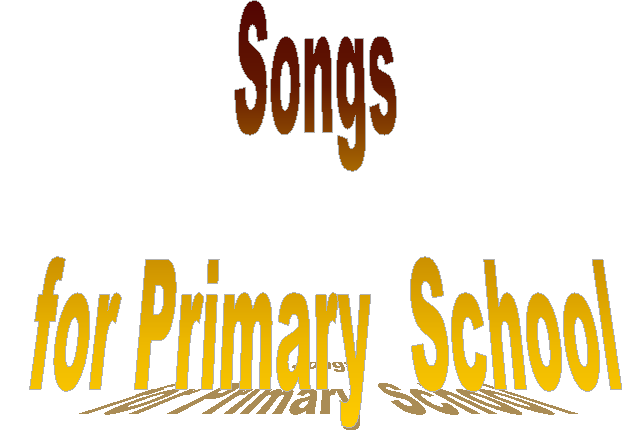
Old MacDonald had a farm
Old MacDonald had a farm
E-I-E-I-O
And on his farm he had a duck
E-I-E-I-O
With a quack-quack here
And a quack-quack there
Here quack, there quack
Everywhere quack-quack.
Old MacDonald had a farm
E-I-E-I-O
And on his farm he had a dog
E-I-E-I-O
With a woof-woof here
And a woof-woof there
Here woof, there woof
Everywhere woof-woof.
Old MacDonald had a farm
E-I-E-I-O
And on his farm he had a cat
E-I-E-I-O
With a meow-meow here
And a meow-meow there
Here meow, there meow
Everywhere meow-meow.
Old MacDonald had a farm
E-I-E-I-O
And on his farm he had a cow
E-I-E-I-O
With a moo-moo here
And a moo-moo there
Here moo, there moo
Everywhere moo-moo.
Old MacDonald had a farm
E-I-E-I-O
And on his farm he had a sheep
E-I-E-I-O
With a baa-baa here
And a baa-baa there
Here baa, there baa
Everywhere baa-baa.
Pre-Listening:
Children usually love domestic animals and will enjoy doing the funny noises.
Pre-teach or revise names of various domestic animals using pictures:
- Ask children to pronounce the names of the animals after you:
Duck, dog, cat, cow, sheep.
- Ask children what animals make these sounds:
Quack, woof, meow, moo, baa.
- Playing game: Here are some cards. The cards have pictures of domestic animals. Other cards have the names of these animals in English .The last cards have the sounds of these animals. You have to try and match the words to the pictures and the sounds.
|
Dog |
Moo |
|
Cat |
Woof |
|
Sheep |
Quack |
|
Duck |
Baa |
|
Cow |
meow |
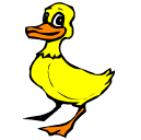
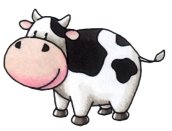
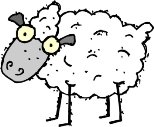

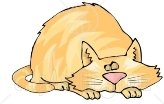
While-Listening;
- You can make up new verses about animals you like with appropriate noises.
- After the two sung verses you can hear just the instrumental and children can sing their new verses along to this background music.
- Create large cards for all the children with the following word or letter written on them (it doesn’t matter if two, three or more children have the same card– get them sitting together and helping each other).Children sit in a circle and listen to the song, when they hear the word from their card they either jump up with it or hold it up (this activity encourages them to listen carefully and pick out individual words – and it’s fun).
For example:
|
E |
I |
O |
Old |
|
MacDonald |
Had |
With |
Farm
|
|
Dog |
Cat |
Here |
There
|
|
Post-Listening:
Create a farm – children choose their favourite animal and draw a picture of it in the farm. Put all the pictures together to create a farm. Older children can also write some information about their animal under the picture.
|
Old Macdonald Had a Zoo.
Old MacDonald had a zoo
E - I – E – I – O
And in his zoo he had a puma
E - I – E – I – O
With a grrr grrr here and a grrr grrr there
Here a grrr, there a grrr
Everywhere grrr, grrr,
Old MacDonald had a zoo
E - I – E – I – O
Old MacDonald had a zoo
E - I – E – I – O
And in his zoo he had a parrot
E - I – E – I – O
With a squawk, squawk here and a squawk, squawk there
Here a squawk, there a squawk
Everywhere squawk, squawk
Old MacDonald had a zoo
E - I – E – I – O
Pre-Listening:
This is a nice variation on Old MacDonald had a farm. Children usually love wild animals and will enjoy doing the funny noises.
Pre-teach or revise names of various wild animals using pictures:
1. Ask the children to pronounce the names of the animals after you.
2. Ask the children about the sounds these animals make.
3. Check that children understand the word ‘zoo’.
4. Playing game: Here are some cards. The cards have pictures of wild animals. Other cards have the names of these animals in English .The last cards have the sounds of these animals. You have to try and match the words, the pictures and the sounds.
While-Listening:
1.You can make up new verses about animals they like with appropriate noises – after the two sung verses you can hear just the instrumental and children can sing their new verses along to this background music.
2. Create large cards for all the children with the following word or letter written on them (it doesn’t matter if two, three or more children have the same card– get them sitting together and helping each other).Children sit in a circle and listen to the song, when they hear the word on their card they either jump up with it or hold it up (this activity encourages them to listen carefully and pick out individual words – and it’s fun).
For example:
|
E |
I |
O |
Old |
|
MacDonald |
Had |
With |
Zoo
|
|
Puma |
Parrot |
Here |
There
|
паси
Create a Zoo display – children choose their favourite zoo animal and draw a picture of it in the zoo. Put all the pictures together to create a zoo. Older children can also write some information about their animal under the picturе
|
PUMA |
PARROT |
|
|
|
|
Grrr |
Squawk |
"Five Little Ducks" is one of the most popular and classic Rebus Rhymes. Touch, play, and interact with your little ones while listening to the song and enjoying the colorful illustrations!
Five little ducks
Five little ducks
Went out one day
Over the hill and far away
Mother duck said
"Quack, quack, quack, quack."
But only four little ducks came back.
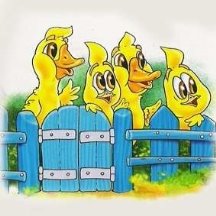 Four little ducks
Four little ducks
Went out one day
Over the hill and far away
Mother duck said
"Quack, quack, quack, quack."
But only three little ducks came back.
Three little ducks
Went out one day
Over the hill and far away
Mother duck said
"Quack, quack, quack, quack."
But only two little ducks came back.
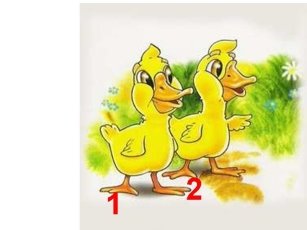 Two little ducks
Two little ducks
Went out one day
Over the hill and far away
Mother duck said
"Quack, quack, quack, quack."
But only one little duck came back.
One little duck
Went out one day
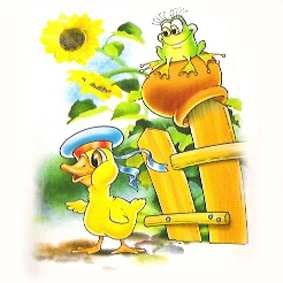 Over the hill and far away
Over the hill and far away
Mother duck said
"Quack, quack, quack, quack."
But none of the five little ducks came back.
Sad mother duck
Went out one day
Over the hill and far away
The sad mother duck said
"Quack, quack, quack."
And all of the five little ducks came back.
Pre-Listening:
1. Ask children to count from one to five.
2. Let`s count ducks. Say after me:
One duck, two ducks, three ducks, four ducks, five ducks.
3. Say after me:
Hill Горб
Far away Далеко
Come back Повертатись
One day Одного разу
Sad mother duck Сумна мама качка
None of Ніхто
While-Listening:
1.Listen to the song again and write three forms of the verbs you met in the text.
Example:
Go-went-gone
Say-said-said
Come-came-come.
2. Make up sentences and translate:
1) five, little, All, ducks, the, came, of, back.
2) of, None, the, little, came, ducks, five, back.
3) quack-quack, duck, Mother, said.
4) day, ducks, went, Five, little, one , out.
5) day, went, one, out, ducks, Four, little.

- Answer the questions:
1. Who went out one day?
2. What did mother duck say?
3. How many ducks cаme back?
4. Where did little ducks go for a walk?
5. All of the five little ducks came back, didn`t they?
6. There were six little ducks, weren`t they?
Post-Listening:
1.Complete the sentences:
1. Five little ducks went out one day … .
2. Mother duck said … .
3. Four little ducks went out one day … .
4. Only two little ducks … back.
5. … mother duck went out one day
6. And all of the five little ducks ….
2. Look at the 1st verse. The words are typed without spaces between them. Separate them:
FivelittleducksWentoutonedayOverthehillandfarawayButonlyfourlittleduckscame
back.
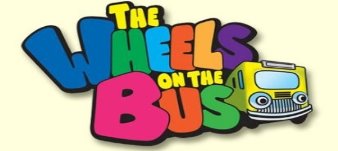
The wheels on the bus go round and round
Round and round
All around the town.
The people on the bus go up and down
Up and down
All around the town.
The driver in the bus says tickets please
Tickets please
All around the town.
The doors on the bus go open and shut
Open and shut.
All around the town.
The wipers on the bus go swish, swish, swish
swish, swish, swish
All around the town
The horn on the bus go beep, beep, beep
beep, beep, beep
All around the town.
Pre-Listening:
1. Say after me:
Wheels, people, driver, doors, wipers, horn.
2. Name the pictures (учитель показує малюнки):
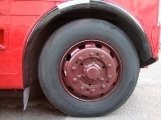

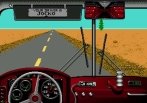
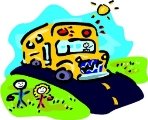
3.Look at the pictures and do the actions.
4. Help Jim to put the following words into the proper boxes:
Round, beep, driver, town, wipers, wheels, people,
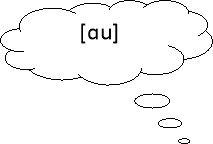


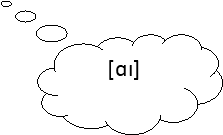
While-Listening:
1. Match the pairs:
1. Wheels a) beep
2. People b) round
3. Driver c) open
4. Doors d) tickets, please
5. Wipers e) up and down
6. Horn f) swish
2. Say if the sentences are true or false:
1. The wheels on the bus go round and round.
2. The driver in the bus says open and shut.
3. The wipers on the bus go beep, beep, beep.
4. The horn on the bus go beep, beep, beep.
5. The doors on the bus go open and shut.
6. The driver on the bus says tickets, please.
Post-Listening:
1.Listen to the song again and put the verses into the correct order :
The people on the bus go up and down
Up and down
All around the town.
The doors on the bus go open and shut
Open and shut.
All around the town.
The wheels on the bus go round and round
Round and round
All around the town.
The horn on the bus go beep, beep, beep
beep, beep, beep
All around the town.
The wipers on the bus go swish, swish, swish
swish, swish, swish
All around the town
Three little kittens
Three little kittens,
They lost their mittens,
And they began to cry,
Oh, mother, dear,
We sadly fear,
That we have lost our mittens.
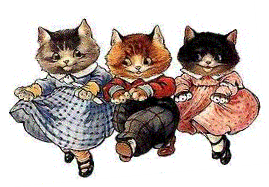 What! Lost your mittens,
What! Lost your mittens,
You naughty kittens,
Then you shall have no pie.
Meow, meow,
Then you shall have no pie.
Three little kittens,
They found their mittens,
And they began to cry,
Oh, mother, dear,
See here, see here,
For we have found our mittens.
Could join your mittens,
You silly kittens,
Then you shall have some pie.
Meow, meow,
Oh, let us have some pie.
Three little kittens,
Put on their mittens,
And soon ate up their pie.
Oh, mother, dear,
We greatly fear,
That we have soiled our mittens.
What! Soiled your mittens
You naughty kittens,
And they began to sigh.
Meow, meow,
And they began to sigh.
Three little kittens,
They washed their mittens,
And hung them out to dry.
Oh, mother, dear,
Do you not hear,
That we have washed our mittens?
What! Washed your mittens?
Then you're good kittens!
But I smell a rat close by.
Meow, meow.
We smell a rat close by.
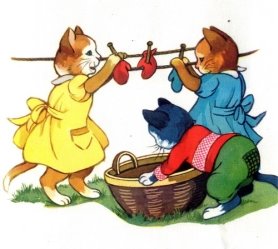
Pre-Listening:
a) Say these verbs after me:
Lost, began, found, put on, ate up, soiled, to sigh, hung, washed, hear, smell,join.
b) Can you divide these verbs into two columns – regular and irregular?
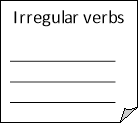
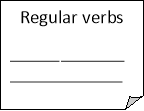
c) Match the verbs with their translation:
Smell Почали
join вдягнули
hear забруднили
washed чути
hung випрали
lost відчувати запах
began повішали
found з’їли
put on знайшли
ate up зітхнути
soiled повісили
to sigh поєднати
d) Use your dictionary to write down three forms of the Irregular verbs.

While-Listening:
- Practicing Vocabulary using Past Simple and Present Perfect:
a)Answer the questions using the verbs:
What did three kittens do?
Sample of answers:
- They lost their mittens.
- They found their mittens.
- They put on their mittens.
- They ate up their pie.
-
 They began to sigh.
They began to sigh.
- What have three kittens done?
Sample of answers:
- have lost their mittens
- have found their mittens
- have soiled their mittens
- have washed their mittens
- How did mother call her kittens?
Sample of answers:
- You naughty kittens.
- You silly kittens.
- You're good kittens!
Post-Listening:
1. Listen to the song and fill in the gaps:
Three little ______,
They lost their _____,
And they began to cry,
Oh, ____, dear,
We sadly fear,
That we have ____our mittens.
What! Lost your mittens,
You naughty kittens,
Then you shall ____ no pie.
Meow, meow,
Then you shall have no ___.
Three little kittens,
They ____ their mittens,
And they began to ____,
Oh, mother, dear,
See here, ___ here,
For we have found our mittens.
Could ____ your mittens,
You silly kittens,
Then you shall have _____ pie.
Meow, meow,
Oh, ___ us have some pie.
Three little kittens,
____ on their mittens,
And soon ___ up their pie.
Oh, mother, dear,
We greatly fear,
That we have ____ our mittens.
What! Soiled your mittens
You naughty kittens,
And ____ began to sigh.
Meow, meow,
And they began to sigh.
Three little kittens,
They washed their mittens,
And hung them out to ____.
Oh, mother, dear,
Do you not _____,
That we have washed our mittens?
What! Washed your mittens?
Then you're ____ kittens!
But I smell a rat close by.
Meow, meow,
We smell a ___ close by.
2. Read the text of the song in roles.
3. Put these sentences in order according to the text of the song:
a) Kittens have soiled their mittens.
b) Kittens have found their mittens.
c) They ate up their pie.
d) They put on their mittens.
e) Kittens have lost their mittens.
f) Kittens have washed their mittens.
g) They began to sigh.
"How are you?"
by Richard Graham.
 Hello, how are you?
Hello, how are you?
I'm hungry,
I'm tired,
I'm cold,
I'm sad
Hello, how are you? - 4
 I'm happy
I'm happy
I'm great
I'm good
I'm OK
Hello, how are you? - 4
Pre-Listening:
1) Explain children the meaning of the words hungry, tired, cold, sad, great, good, ok using the translations of these words.
2) Ask them to read the words after you and then one by one.
3) Propose them to match the pairs:
1. I'm hungry a) я щасливий
2. I'm OK b) мені сумно
3. I'm tired c) мені холодно
4. I'm good d) мені добре
5. I'm great e) я голодний
6. I'm happy f) у мене все в порядку
7. I'm sad g) я чудово почуваюсь
8. I'm cold h) я втомлений
While-Listening:
1. Listen to the song and fill in the gaps:
Hello, how are … ? - 4
I'm hungry,
… tired,
I'm … ,
I'm …
… , how are you? – 4
… happy
I'm great
I'm …
I'm …
Hello, how are you? – 4
Post-Listening:
1.Look at the pictures and say as in example:
I am…
1.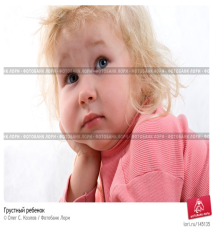 2.
2. 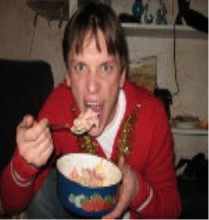
3.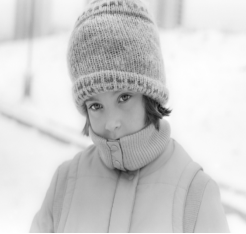 4.
4. 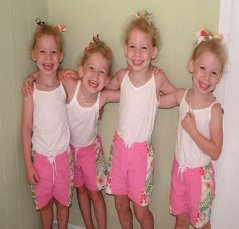
2. Now tell us about you.
How are you?
Give an answer and ask your friends.
B-I-N-G-O!
There was a farmer had a dog,
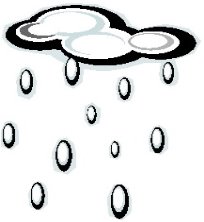 And Bingo was his name-o.
And Bingo was his name-o.
B-I-N-G-O!- 3
And Bingo was his name-o!
There was a farmer had a dog,
And Bingo was his name-o.
(Clap)-I-N-G-O!- 3
And Bingo was his name-o!
There was a farmer had a dog,
And Bingo was his name-o.
(Clap, clap)-N-G-O!- 3
And Bingo was his name-o!
There was a farmer had a dog,
And Bingo was his name-o.
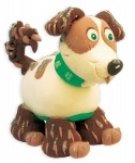 (Clap, clap, clap)-G-O!-3
(Clap, clap, clap)-G-O!-3
And Bingo was his name-o!
There was a farmer had a dog,
And Bingo was his name-o.
(Clap, clap, clap, clap)-O!-3
And Bingo was his name-o!
There was a farmer had a dog,
And Bingo was his name-o.
(Clap, clap, clap, clap, clap)-3
And Bingo was his name-o!
Pre-Listening:
- Let`s memorize.
- Pronounce the letters of the alphabet together.
- I shall show you the cards with the letters and your task is to pronounce them.
- Now name the letter and its sound it.
While-Listening:
1. Listen to the song and put the sentences in correct order:
a) B-I-N-G-O!- 3
b) And Bingo was his name-o!
c) And Bingo was his name-o.
d) There was a farmer had a dog,
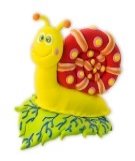 2. Fill in the missing words or letters:
2. Fill in the missing words or letters:
There … a farmer had a … ,
… Bingo was … name-o.
…-I-N-…-O!- 3
And Bingo was his … -o!
Post-Listening:
- Translate the sentences:
- Фермер мав собаку;
- У хлопчика була книга;
- У дівчинки було кошеня»
- У мами була нова сукня.
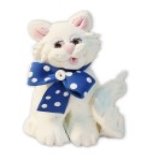 I bought a pretty cat
I bought a pretty cat
I bought a pretty cat
My cat pleased me
I fed my cat under that old tree
My cat says ‘Fiddle-I-fee!’
I bought a pretty duck
My duck pleased me
I fed my duck under that old tree
My duck says quack, quack
My cat says Fiddle–I–fee!
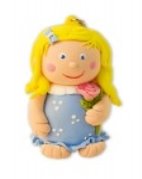
I bought a pretty goose
My goose pleased me
I fed my goose under that old tree
My goose says gaggle, gaggle
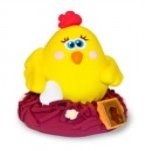 My duck says quack, quack
My duck says quack, quack
My cat says Fiddle–I–fee!
I bought a pretty hen
My hen pleased me
I fed my hen under that old tree
My hen says shimmy shack, shimmy shack
My goose says gaggle, gaggle
My duck says quack, quack
My cat says Fiddle–I–fee!
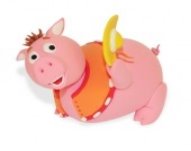 I bought a pretty pig
I bought a pretty pig
My pig pleased me
I fed my pig under that old tree
My pig says oink, oink,
My hen says shimmy shack, shimmy shack
My goose says gaggle, gaggle
My duck says quack, quack
My cat says Fiddle–I–fee!
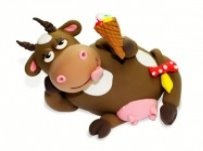 I bought a pretty cow
I bought a pretty cow
My cow pleased me
I fed my cow under that old tree
My cow says moo, moo
My pig says oink, oink
My hen says shimmy shack, shimmy shack
My goose says gaggle, gaggle
My duck says quack, quack
My cat says Fiddle–I–fee!
I bought a pretty horse
My horse pleased me
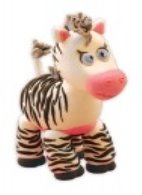 I fed my horse under that old tree
I fed my horse under that old tree
My horse says neigh, neigh
My cow says moo, moo
My pig says oink, oink
My hen says shimmy shack, shimmy shack
My goose says gaggle, gaggle
My duck says quack, quack
My cat says Fiddle–I–fee!
Pre-Listening:
- I want you to learn the names of some domestic animals.
Let`s look at the picture and name the animals.
1.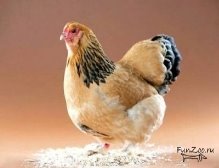 2
2 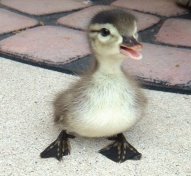
3. 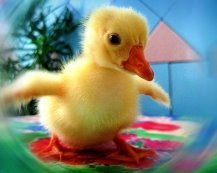 4.
4.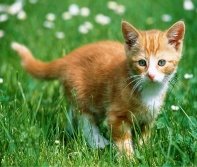 5.
5. 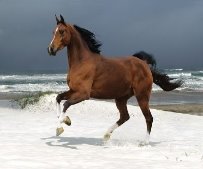 6
6  7.
7. 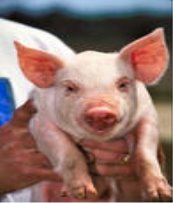
Do you know what noises all these animals make?
While-Listening:
Match the pairs:
- A cat a) neigh, neigh [nei]
- A duck b) oink,oink [oink]
- A goose c) gaggle, gaggle [g gl]
- A hen d) moo, moo [mu:]
- A pig e) shimmy shark [ imi a:k ]
- A cow f) quack, quack [kwa:k]
- A horse g) meow, meow [miau]
Try to imitate animal noises with the help of the game. Imagine that you are a cat ( a cow,…)
Post-Listening:
1. Do you like the song? Why?
2. Translate the sentences:
1. Я купив гарненького кота ( каченя, курку, гуску, корову, порося, коня).
2. Я годував кота ( каченя, …).
3. Моє каченя (кіт,…) каже кря-кря ( мяу-мяу,…).

\
THE HOKEY POKEY SONG
( It’s time for the hokey pokey, here we go!)
You put your head in, you put your head out,
You put your head in and you wiggle, wiggle, wiggle.
You do the hokey pokey spin around , clap, clap, clap, clap.
You put your ears in, you put your ears out,
You put your head ears in and you wiggle, wiggle, wiggle.
You do the hokey pokey spin around , clap, clap, clap, clap.
You do the hokey pokey, hands up, hands down
Do the hokey pokey, hands in front and hands behind
Jump in, jump out, jump in and wiggle, wiggle, wiggle
You do the hokey pokey spin around , clap, clap, clap.
(OK! Now your hands!)
Put your hands in, put your hands out,
Put your hands in and wiggle….
Do the hokey pokey spin around , clap, clap, clap, clap.
You do the hokey pokey, hands up, hands down
Do the hokey pokey, hands in front and hands behind
(OK! Last verse)
Put your knees in, put your knees out,
Put your knees in and wiggle….
Do the hokey pokey spin around , clap, clap, clap, clap.
(Ok, now sit down)
Put your feet in, put your feet out, put your feet in and wiggle…
You do the hokey pokey stand up , clap, clap, clap, clap.
You do the hokey pokey, hands up, hands down
Do the hokey pokey, hands in front and hands behind
You do the hokey pokey, hands up, hands down
Do the hokey pokey, ‘cause that’s what its all about!
(All right! Great job! That was fun!!!)
Pre-Listening:
1. Look at the pictures and learn some new words.
Say after me, please:
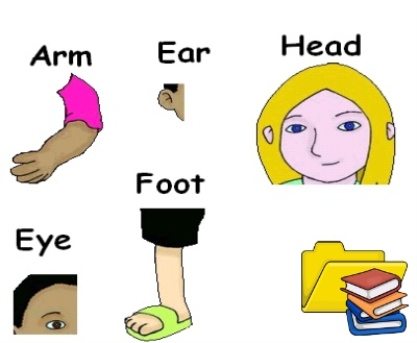
2. Let`s learn some verbs which we can meet in the song.
3. Say after me and do the actions (if you can):
- Put in (out)
- Clap
- Wiggle
-
 Jump in (out)
Jump in (out)
- Spin around
- Sit down
- Stand up
- Do
While-Listening:
1. Listen to the song and do the actions (after me):
2. Try to sing the 1st (2,3…) verse with me
Post-Listening:
- Listen to me carefully and show me parts of your body:
hands, head, feet, knees, ears, shoulders.
- Let`s try another variant of the song:
«The Hokey Pokey»
(Okay, boys and girls! Ready? Okay!)
you put your right hand in,
you put your right hand out,
you put your right hand in and you shake it all about
you do the hokey pokey and
turn yourself around
that's what it's all about!
[continue in this manner for the following body parts]
Left hand, right foot, left foot, right elbow, left elbow, right knee,
left knee, right shoulder, left shoulder, whole self, back side.

 Welcome To Duloc
Welcome To Duloc
Welcome to Duloc
Such a perfect town
 Here we have some rules let us lay them down
Here we have some rules let us lay them down
Don't make waves
Stay in line
And we'll get along fine
Duloc is a perfect place
Please keep off of the grass
Shine your shoes
Wipe your...face
Duloc is
Duloc is
Duloc is a perfect place
Pre-Listening:
Have you seen the cartoon ‘’Shrek’’? Who were the main heroes?
Today we shall learn the song “Welcome to Duloc!”
First of all we should learn some new phrases to understand the song.
a)Let`s translate them:
- To have rules
- To lay down
- To make waves
- To stay in line
- To get along
- To keep off
- To shine shoes
- Wipe face
b) Say after me, please:
c) Match the pairs:
1. висловлювати (думку) а)Wipe face
2. викликати неприємності b) To have rules
3. триматися подалі c) To get along
4. мати правила d) To keep off
5. ладнати з e) To shine shoes
6. витирати f) To lay down
7. дотримуватись правил g) To make waves
8. чистити взуття h) To stay in line
While-Listening:
Listen to the song carefully and write down:
a) the adjectives from the text;
b) the verbs;
c) the nouns.
Fill in the table:
|
adjectives |
nouns |
verbs |
|
|
|
|
|
|
|
|
|
|
|
|
|
|
|
|
|
|
|
|
|
|
|
|
|
|
|
|
|
|
|
|
- Listen to the song again and put the sentences into the correct order:
- Please, keep off of the grass
- We have some rules
- Wipe your...face
- Welcome to Duloc
- Shine your shoes
- Don't make waves
- Stay in line
- Duloc is a perfect place
- We'll get along fine
Post-Listening:
1. Let`s sing a song together, using the text.
2. Answer the question, please:
Which rules are there in Duloc?

Last Christmas is one of the most popular Christmas songs of the 1980s. Given below are the lyrics of the song, which has been sung by George Michael.
Last Christmas

Refrain - twice
Last Christmas I gave you my heart
But the very next day you gave it away
This year to save me from tears
I'll give it to someone special.
I.
Once bitten and twice shy
I keep my distance but you still catch my eye
Tell me baby, do you recognize me?
Well it's been a year it doesn't surprise me
(Happy Christmas!)
I wrapped it up and sent it
With a note saying, "I love you" I meant it
Now I know what a fool I've been
But if you kissed me now I know you'd fool me again.
Refrain - twice
II.
A crowded room, friends with tired eyes
I'm hiding from you and your soul of ice
My God I thought you were someone to rely on
Me? I guess I was a shoulder to cry on.
A face of a lover with a fire in his heart
A man undercover but you tore me apart
Now I've found a real love you'll never fool me again.
Refrain - twice
A face of a lover with a fire in his heart
A man undercover but you tore me apart
Maybe next year
I'll give it to someone
I'll give it to someone special.

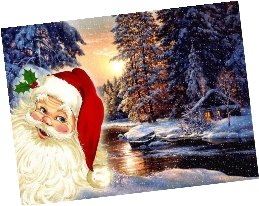
Pre-Listening:
1.Study the following vocabulary:
the very next day – вже наступного дня
to save – зберегти
to bite (bit, bitten) – кусати
shy – сором’язливий
Once bitten and twice shy – тут: Тепер я буду обережним (більше цього не зроблю)
to catch one’s eye – привертати увагу
to recognize – впізнавати
to wrap up – загортати
to mean (mean, meant) – мати на увазі
to fool smb.-обдурити
a crowd – натовп
tired – втомлений
a soul – душа
to rely on – довіритись
a man undercover – тут: супермен, секретний агент
to tear (tore, torn) apart – розірвати на шматки
While-Listening:
- Find the synonyms for the words and expressions in the song:
a) to prevent - ________________
b) to attract attention - ____________
c) to trust - ____________
d) a superman - ____________
e) true - _______________
f) to remember - _______________
- Answer the questions:
1. When did this story take place?
2. What happened to the main character?
3. What did he sent to his girl?
4. Did the girl really love him?
5. Whom does the man want to give his heart to this year?
3.Listen to the song again and fill in the gaps (1-20):
LAST CHRISTMAS
Refrain - twice
Last Christmas I gave you my __1__
But the very next _2__ you gave it __3_
This year to _4__ me from tears
I'll give it to someone _5__.
I.
Once bitten and twice _6__
I keep my distance but you still catch my _7__
Tell me _8__, do you recognize me?
Well it's been a year it doesn't _9__ me
(Happy Christmas!)
I wrapped it up and _10__it
With a note saying, "I love you" I __11_ it
Now I know what a fool I've been
But if you kissed me now I know you'd _12__me again.
Refrain - twice
II.
A crowded room, friends with tired _13__
I'm hiding from you and your soul of __14_
My God I thought you were someone to _15__ on
Me? I guess I was a shoulder to _16__ on.
A face of a lover with a fire in his __17_
A man _18__ but you tore me __19_
Now I've found a real _20__ you'll never fool me again.
Yesterday
(The Beatles)
Yesterday, all my troubles seemed so far away
Now it looks as though they’re here to stay
Oh, I believe in yesterday.
Suddenly, I’m not half the man I used to be,
There’s a shadow hanging over me.
Oh, yesterday came suddenly.
Why she had to go I don’t know she wouldn’t say.
I said something wrong, now I long for yesterday.
Yesterday, love was such an easy game to play.
Now I need a place to hide away.
Oh, I believe in yesterday.

Pre-Listening:
Listen to the text about John Lennon, a singer of the group “The Beatles”.
Complete the information.
John Lennon was one of the most famous musicians of the 20-th century. He was born on October, 9, 1940 in Liverpool, England. It was war time and John’s second name was Winston because of prime-minister Winston Churchill.
When John was 5 his father went away. A little boy went to live with Aunt Mimi and Uncle George, but he often saw his mother. She taught him how to play his first instrument, a banjo.
Then when John was 17, his mother died in a road accident. John later wrote songs about her.
John was very intelligent, but he didn’t like school. He failed his school exams in 1957 he went to college to study art. He was a very clever artist and always enjoyed drawing and painting. When he was at school he started a band called “The Quarry Men”. Then one day in 1957 he met a boy called Paul McCartney and Paul joined the band. They later met George Harrison and Ringo Starr and became the world famous band The Beatles.
John got married twice. His first wife was called Cynthia. His son Julian was born in 1963. Later when The Beatles were very famous John met a Japanese artist called Yoko Ono. They got married in 1969. Their son Sean was born on John’s 35-th birthday. John and Yoko lived in New York.
 One terrible day in 1980 a man called Mark Chapman killed John outside his house.
One terrible day in 1980 a man called Mark Chapman killed John outside his house.
Complete the information.
born: 1_____________
age when his father left: 2________________
went to live with: 3______________
age when his mother died: 4________________
subject at college: 5 __________
year he met Paul McCartney: 6 ______________
lived with Yoko Ono in: 7___________
year he died: 8________
While-Listening:
1. Listen to the song “Yesterday” and find the words which sound the same as:
1) day
2) me
3) no
2.Find antonyms for the words in the song:
- today - __________
- difficult - ___________
- to keep silence - ___________
- daylight - _____________
- right - _________
- there - __________
- to leave - ___________
- to find - __________
Post-Listening:
Identify the separate words and sentences:
- yesterdayallmytroublesseemedsofarawaynowitlooksasthoughtheyreheretostayohIbelieveinyesterday.
- suddenlyimnothalfthemaniusedtobetheresashadowhangingovermeohyesterdaycamesuddenly.
- whyshehadtogoidontknowshewouldntsayisaidsomethingwrongnowilongforyesterday.
- yesterdaylovewassuchaneasygametoplaynowineedaplacetohideawayohibelieveinyesterday.
2. Give the literary translation of the song
Mama (sung by Kelly family)
Why did you have to die?
When I was only at the age of five
So suddenly you've gone
And I was left with answers hard to find.
Now I think of your 'cause I'm in hunger for your warmth
That no one can replace
And I know that there I go
You are always by my side
I just want to let you know.
Chorus.
Mama oh I miss you sometimes
Mama can you hear me when I cry
Mama oh I miss you sometimes
Mama can you hear me when I cry for you
Your spirit never dies
And all your words I treasure in my heart
You left me with a smile.
But my cheeks aren't always dry from all the tears
Now I think of you 'cause I'm in hunger for your warmth
That no one can replace
And I know that where I go
You're always by my side
I just want to let you know.

Pre-Listening:
1. Read the text about the group. Try to guess the meaning of the bald words.
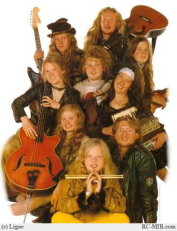
The history of the Kelly Family must be one of the most unusual band
biographies there is. In 1966, dancer Barbara Ann and her husband Daniel Jerome Kelly leave the USA with the four children Danny, Caroline, Paul and Kathy and settle southern Spain. The children begin singing and dancing to folk music with their parents there. Because they enjoy making music, they start appearing at birthday parties, weddings. The father gives up the business and starts singing with children.
Mother Barbara gives the children ballet lessons at home, and they take music lessons. Under the name of “Kelly Kids”, the family make their Spanish television debut in 1975 and go on tour through Spain.
Once when they were sightseeing in Italy the Kellys' minibus was robbed, leaving only their instruments and passports. Seriously short of money now, the family starts singing on the street. Passers-by stop in amazement and the collecting-basket keeps filling up with money. At the end of the first day, Dan tells his children: "Kids, our life has changed!" They go on from Italy to Austria, Ireland, Germany and the Netherlands. Not long after that, they sign their first record contract. They get their first Number 1 hit in Holland and Belgium in 1980.
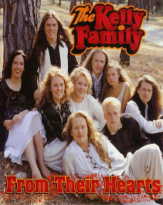 The Kelly children's mother falls ill with breast cancer in 1981. The family returns to Pamplona, Spain. A year later she dies Kellys take her last wish, "Keep on singing", as a promise.
The Kelly children's mother falls ill with breast cancer in 1981. The family returns to Pamplona, Spain. A year later she dies Kellys take her last wish, "Keep on singing", as a promise.
In 1998 they buy their first house in Amsterdam. In 1990: Father Dan is paralyzed down his right side The Kelly children go on tour alone for the first time. Thanks to his iron discipline, their father gets back on his feet, and for the first time since his illness, he appears with his kids in 1994 in front of 16,000 people on the stage of the Westfalenhalle in Dortmund.
The family fills all Europe's football stadiums and makes its biggest live appearance in Vienna before the audience of 250,000.
Meanwhile, the Kellys are known on other continents, in countries such as China, South Africa and the USA.
There are 9 brothers in the group. They play lots of musical instruments: keyboards, accordion, guitars, mandolin, harp, drums, harmonica, and percussion. They have 16 video albums and 15 CD albums. The youngest of the brothers is Angelo. He is 17. All the songs are written, composed, performed and produced by the Kelly family.
2.Answer the questions to the text:
1.Why does the history of the Kelly family have the most unusual biography?
2.What kind of music did they start to sing in Spain?
3.What lessons did their mum give them at home?
4.What lessons did they take?
5.Why did their family have to sing in the streets in Italy?
6.What did they promise their mum when she died?
7.What happened to their father?
8.What is special about the group?
9.How old is the youngest of the brothers?
10. What was their biggest appearance?
11. How many brothers are there in the group?
2. Think of yourself and your family. Answer the questions:
Who are the dearest people for you in your life?
How do you get on with your mum?
What words could you use to describe your mum?
Is she always by your side?
Do you miss her when you go on holidays without her?
Do you ever cry for her? Did you use to when you were a small kid?
What kind of problems do you have when your mum is not beside you?
While-Listening:
1. Listen to the song and feel in the gaps:
Mama
Why did you ______ die?
When I was ______ at the age of five
So suddenly you've gone
And I was left with _______ hard to find.
Now I ______ of your 'cause I'm in hunger for your warmth
That no one can replace
And I know that there I go
You are _______ by my side
I just want to let you know.
Chorus:
Mama oh I ____ you sometimes
Mama can you hear me when I cry
Mama oh I miss you sometimes
Mama can you hear me when I cry for you
Your spirit never dies
And all your words I treasure in my _____
You left me with a smile.
But my cheeks aren't always ____ from all the tears
Now I think of you 'cause I'm in hunger for your warmth
That no one can _____
And I know that where I go
You're always by my side
I just want to let you _______
2. Find the synonyms for the words and expressions in the song:
difficult
need
next to me
keep inside
tell you
take your place
feel sad because someone is not with you
the part of the person that exists after death
quickly
Post - Listening:
1. Write some sentences to describe how the singer feels:
1. How old was the singer when his mum died?
2.What was he left with?
3.What is he in hunger for?
4.Can anyone replace his mum?
5.What does he want to let her know?
6.Where does the singer treasure his words?
7.How did his mum leave him?
8.Why aren't his cheeks always dry?
2. Compare your writing with the partner. Refer to the song if you have problems.
Show Must Go On (Queen)
I. Empty spaces. What are we living for?
Abandoned places, I guess we know the score
On and on. Does anybody know what we are looking for?
Another hero. Another mindless crime
Behind the curtain. In the pantomime hold the line.
Does anybody want to take it anymore?
The show must go on- (2 times)
Inside my heart is breaking
My make-up may be flaking, but my smile still stays on
II. Whatever happens, I'll leave it all to chance
Another heartache, another failed romance
On and on. Does anybody know what we are living for?
I guess I'm learning, I must be warmer now
I'll soon be turning round the corner now
Outside the dawn is breaking but inside, in the dark
I'm aching to be free.
The show must go on- (2 times)
Inside my heart is breaking
My make-up may be flaking,
But my smile still stays on
III. My soul is painted, like the wings of butterflies
Fairytales of yesterday will grow but never die
I can fly, my friends
The show must go on (yeah)
The show must go on
I'll face it with a grin
I'm never giving in
On with the show
Ooh, I'll top the bill, I'll overkill
I have to find the will to carry on
(On with the show)The show must go on
(go on, go on, go on...)
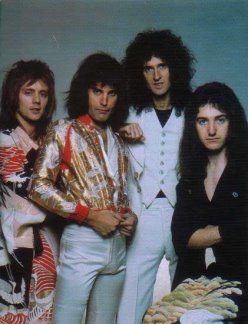 Pre-Listening:
Pre-Listening:
1. Read about the famous rock band “Queen” and do the tasks:
“Queen” is a British rock band formed in London in 1971 and one of the most commercially successful musical acts of all time. The group originally consisted of Freddie Mercury, (lead vocals), Brian May (lead guitar, vocals), John Deacon (bass guitar), and Roger Taylor (drums, vocals). “Queen” enjoyed success in the UK during the early 1970s. The band has released a total of 18 number one albums, 18 number one singles, and 10 number one DVDs worldwide making them one of the world's best-selling music artists. They have been honoured with seven Ivor Novello awards and were inducted into the Rock and Roll Hall of Fame in 2001. Queen became one of the most popular bands in the world in the mid-'70s; in England, they remained second only to the Beatles in popularity and collectability in the '90s. One of the most popular “Queen`s” hits is “Show must go on”. This song has become an autobiographical story of Mercury`s life. In 1991 Mercury died of bronchopneumonia.
2. Answer the questions:
1. When and where was the band formed?
2. Name the members of the band.
3. When did “Queen” enjoy success in the UK?
4. What is one of the most popular “Queen`s” hits?
5. When did Mercury die?
While-Listening:
- Listen to the song “Show must go on”. Try to explain the meaning of the following phrases:
a) My soul is painted, like the wings of butterflies
b) My make-up may be flaking,
But my smile still stays on
c) I guess I'm learning, I must be warmer now
d) The show must go on
Post-Listening:
1. Say, what questions the author raises in his song. Can you answer these questions?
2. Match these adjectives to the proper words from the song:
Empty soul
abandoned places
mindless spaces
failed I must be
warmer crime
free to be
painted romance
3. Find the synonyms for the words and expressions in the song:
To keep on going
To seek
To become older
To study
To remain
To think
A performance
To realize
Bob Marley - Don’t Worry, Be Happy
(whistling)
Here's a little song I wrote,
You might want to sing it note for note,
Don't worry, be happy
In every life we have some trouble,
When you worry you make it double
Don't worry, be happy- 5

Ain’t got no place to lay your head,
Somebody came and took your bed,
Don't worry, be happy
The landlord say your rent is late,
He may have to litigate,
Don’t worry (small laugh) be happy,
(look at me I`m happy,)
Don't worry, be happy
(I give you my phone number,
when your worried, call me,
I make you happy)
Don't worry, be happy
Ain’t got no cash, ain’t got no style,
Ain’t got no gal to make you smile
But don't worry, be happy
Coz when you worry, your face will frown,
And that will bring everybody down,
So don't worry, be happy
 Don't worry, be happy now...
Don't worry, be happy now...
( 1st verse)
don't worry, don't worry, don't do it,
be happy, put a smile on your face,
don't bring everybody down like this
don't worry, it will soon pass whatever it is,
Do not worry ,be happy, I am not worry ,I am happy
Pre-Listening:
- Let`s remember the translations of some words in the song:
- A note – нота
- Trouble- клопіт
- Double- подвійний, подвоюватися
-
 Landlord - землевласник
Landlord - землевласник
- Rent - рента
- Gal=girl
- Frown -похмурий
- Bring down – збити з пантелику.
- Litigate - судитися
- Unscramble the words:
Netr, gla, londllard, ubledo, udletro, rowfn.
While-Listening:
1.Listen to the song (1st verse) and fill in the missing words:
Here's a … … І wrote,
you might want … it note for note,
don't … , be …
in every life we … … trouble,
when you worry … … it double
… worry, … happy
2. Listen to the 2-nd and the 3-rd verse and give the English equivalents to the following word-combinations:
-
 Прилягти відпочити
Прилягти відпочити
- Змусити всміхатися
- Кишенькові гроші
- Зайняти ліжко
- Обличчя стає похмурим
- Землевласник говорить, що …
- Зіб`є кожного з пантелику
3. Find the verbs in the text and say if they are regular or irregular. Give three forms of irregular verbs.
Post-Listening:
- Answer the questions to the song:
- Do you think this song is optimistic or pessimistic?
- When does our trouble become double?
- What does the landlord say?
- How does your appearance change when you worry?


Hakuna Matata
[Timon:] Hakuna Matata! What a wonderful phrase
[Pumba:] Hakuna Matata! Ain't no passing craze
 [Timon:] It means no worries
[Timon:] It means no worries
For the rest of your days
[Both:] It's our problem-free Philosophy
[Timon:] Hakuna Matata!
[Spoken section over background]
[Timon:] Why, when he was a young warthog...
[Pumba: Italian counter-tenor range]
When I was a young warthoooog!
[Timon: Speaking, cleaning ear ] Very nice.
[Pumba:] Thanks!
[Timon: Singing ] He found his aroma lacked a certain appeal He could clear the savannah after every meal
[Pumba:] I'm a sensitive soul, though
I seem thick-skinned
And it hurt that my friends never stood downwind. And oh, the shame
[Timon:] He was ashamed! Thoughta changin' my name Oh, what's in a name? And I got downhearted. How did you feel? Everytime that I...
[Timon: Speaking ] Pumba! Not in front of the kids!
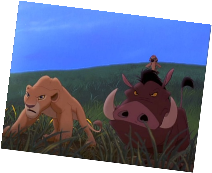 [Pumba:Speaking ] Oh... sorry.
[Pumba:Speaking ] Oh... sorry.
[Pumba and Timon:] Hakuna Matata! What a wonderful phrase Hakuna
Matata! Ain't no passing craze
[Simba:] It means no worries For the rest of your days
[Timon:] Yeah, sing it, kid!
Its our problem-free[Pumba:] Philosophy
Pre-Listening:
1. Look at the title of the song and at the pictures. Guess the song of what cartoon we are going to discuss. Who are the main characters of the cartoon?
While-Listening:
1. Listen to the 1st part of the song (refrain) and say if you heard such phrases:
- Hakuna Matata- what a wonderful phrase!
- For the rest of my days
- When I was a young warthoooog!
- Hakuna Matata - it means no worries
- Hakuna Matata - It's our problem-free
- Listen to the dialogue ( part 2), using some translations:
- Warthog- африканський кабан
- lacked a certain appeal- бракувало привабливості
- thick-skinned- товстошкірий, непробивний
- sensitive soul – чутливий дух
-
 to be ashamed- бути осоромленим
to be ashamed- бути осоромленим
- downhearted – пригнічений
- stand downwind – розуміти когось
- Complete the sentences according to the text:
- When I was a …. Warthog
- He … his … lacked a certain appeal
- I'm a … soul, though I seem thick-… .
- My … never … downwind.
- I … downhearted.
Post-Listening:
- Fill in the words (in front of, ashamed, warthog, downwind, downhearted):
-
 Not … … the kids!!!!
Not … … the kids!!!!
- I was … .
- My friends never stood … .
- He was … .
- When I was a young … .
- Give the translations of the previous sentences.
Jack and Jill
Jack and Jill went up the hill
To fetch a pail of water.
Jack fell down and broke his crown
And Jill came tumbling after.
Then up Jack got and home did trot
As fast as he could caper;
He went to bed and plastered to his head
With vinegar and brown paper.
Jill came in and she did grin
To see Jack's paper plaster;
Mother vexed did whip her next
For causing Jack's disaster.
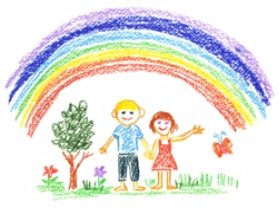
Pre-Listening:
- Look at the title of the song and say who are the main characters of this song?
- There are some word-combinations in the text which you don’t know . Let`s try to guess their meanings:
- To fetch a pail of water a) сердитися, дратуватися
- To come tumbling b) стрибати
- To do trot c) принести відро води
- To caper d) летіти соколом, швидко
- To do grin e) скотитися сторчака (рос. – кувырком)
- To vex f) усміхатися, шкірити зуби
- To do whip g) відхльостати, побити
- Let’s play a game: a) I want you to be my echo. So say the word-combinations after me, please. b) Now we are Sasha`s ( Andrew`s, …`s) echo.
While-Listening:
- Complete the sentences:
- Jack fell down a) did whip her next
- And Jill came b) and plastered to his head
- Then up Jack got c) and broke his crown
- He went to bed d) tumbling after.
- Jill came in e) and home did trot
-
 Mother vexed f) and she did grin
Mother vexed f) and she did grin
2. Listen to the song carefully for several times. Place the words which contain such sounds in the columns:
|
[ i ] |
[ e ] |
[ o ] |
[ ei ] |
|
|
|
|
|
|
|
|
|
|
|
|
|
|
|
|
|
|
|
|
|
|
|
|
|
|
|
|
|
|
|
|
|
|
|
Post-Listening:
- Translate the sentences:
- Він побив свого брата, тому що хлопець не приніс відро води.
- Діти швидко бігли, тому вони й скотилися сторчака з горба.
-
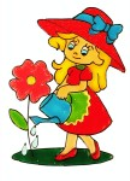 Мама була розсерджена, а діти лише посміхалися.
Мама була розсерджена, а діти лише посміхалися.
The Earth Song (sung by Michael Jackson)
1. What about sunrise, what about rain
What about all the things that you said we were to gain
What about killing fields, is there a time
What about all the things that you said was yours and mine
Did you ever stop to notice all the blood we've shed before
Did you ever stop to notice this crying Earth, these weeping shores?
Aaaaaaaaaah Uuuuuuuuuuh
2. What have we done to the world, look what we've done
What about all the peace that you pledge your only son
What about flowering fields, is there a time
What about all the dreams that you said was yours and mine
Did you ever stop to notice all the children dead from war
Did you ever stop to notice this crying Earth, these weeping shores
Aaaaaaaaaah Uuuuuuuuuuh
3. I used to dream, I used to glance beyond the stars
Now I don't know where we are although I know we've drifted far
Aaaaaaaaaah Uuuuuuuuuuh
a)Hey, what about yesterday (what about us)
What about the seas (what about us)
The heavens are falling down (what about us)
I can't even breathe (what about us)
What about Africans (what about us)
I ain't even you (what about us)
What about nature's worth (ooh ooh)
It's our planet's womb (what about us)
b)What about animals (what about it)
We've turned kingdoms to dust (what about us)
What about elephants (what about us)
Have we lost their trust (what about us)
What about crying whales (what about us)
We're ravaging the seas (what about us)
What about forest trails (ooh ooh)
Burnt despite our pleas (what about us)
c)What about the holy land (what about it)
Torn apart by creed (what about us)
What about the common man (what about us)
Can't we set him free (what about us)
What about children dying (what about us)
Can't you hear them cry (what about us)
Where did we go wrong (ooh ooh)
Someone tell me why (what about us)
d)What about babies born (what about it)
What about the days (what about us)
What about all their joy (what about us)
What about the man (what about us)
What about the crying man (what about us)
What about Abraham (what about us)
What about death again (ooh ooh)
You don't give a damn
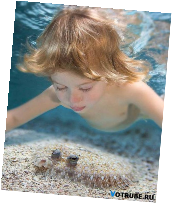

The song is long and it would be better to work with its parts.
PART 1 ( 1ST VERSE)
Pre-Listening:
Look at these words and remember their translations:
1.to gain – отримати користь;
2.to notice- помічати;
3.to shed- проливати;
4.weeping- плачучий, ридаючий
5.shore- берег
- Match the word-combinations and their translations:
- what about a) ти коли-небудь…
- we were to gain в) що до…
- yours and mine с) ми вже пролили
- did you ever d) твій і мій
- we've shed before е) ми повинні отримувати
користь
While-Listening:
- Listen to the 1-st verse and fill in the gaps:
.… about sunrise, what about …
What about … the things that you said we were …
What about … fields, is there a …
What … all the things that you said was … and mine
Did you ever … to notice all the blood we've shed …
Did you … stop to notice this crying Earth, these … shores?
2. Were these word -combinations mentioned during the song? Put “+” or “-”
1.What about sunrise?
2.Stop to notice all the blood.
3.What about animals?
4.This crying Earth.
5.What about all the dreams?
PART 2 (2-nd VERSE)
Pre-Listening:
- Let`s refresh the Present Perfect Tense. What are the auxiliary verbs of the Present Perfect?
- Translate the sentences into Ukrainian:
- What have we done to the world?
- Look what we've done.
- Have you ever noticed all the blood we've shed before?
While-Listening:
1. Match the parts of the sentences:
- What have we done a) that you said was
to the world yours and mine
- What about all the b) that you pledge your
peace only son
- What about flowering c) look what we've done
fields
- What about all the dreams d) is there a time
PART 3 (3-rd VERSE)
Pre-Listening:
1. In the 3-rd verse you can see the construction “used to”:
Використовується для опису дій, звичок або стану, що були у минулому, але більше не відбуваються.
E.g. 1. I used to drive to work but now I take the bus.
2. She used to have really long hair but she’s had it all cut off.
3. I didn’t use to like him but now I do.
2. Find “used to”-constructions in the text.
3. Let`s translate some new words:
- beyond- удалину;
- to glance- поглянути;
- although- хоча;
- to drift- рухатися.
While-Listening:
Listen to the song and fill in the words: although, beyond, dream, drifted far
I used to … , I used to glance … the stars.
Now I don't know where we are … I know we've … ... .
Past-Listening:
1. I want to divide you into 4 teams. There are 4 parts of the text ( a, b, c, d). The task of each team is to read and translate their own part.
London Bridge Is Falling Down
 London Bridge is falling down,
London Bridge is falling down,
Falling down, falling down.
London Bridge is falling down,
My fair lady.
Build it up with silver and gold,
Silver and gold, silver and gold.
Build it up with silver and gold,
My fair lady.
Gold and silver I have none,
I have none, I have none.
Gold and silver I have none,
My fair lady.
Build it up with needles and pins,
Needles and pins, needles and pins.
Build it up with needles and pins,
My fair lady.
Pins and needles bend and break,
Bend and break, bend and break.
Pins and needles bend and break,
My fair lady.
Build it up with wood and clay,
 Wood and clay, wood and clay.
Wood and clay, wood and clay.
Build it up with wood and clay,
My fair lady.
Wood and clay will wash away,
Wash away, wash away.
Wood and clay will wash away,
My fair lady.
Build it up with stone so strong,
Stone so strong, stone so strong.
Build it up with stone so strong,
My fair lady.
Stone so strong will last so long,
Last so long, last so long.
Stone so strong will last so long,
My fair lady.
Pre-Listening:
1. Say after me:
Bridge, fell, fair, build up with it, stick , stone, wood, clay, wash away, iron, steel, bend, bow.
2. Choose the right variant:
I have none
А) у мене немає В) у мене є С) у мене є багато
Bend and break
А) погнеться та зламається В) зламається С) загубиться
Wash away
A) розмиватися В) будуватися С) ламатися
Stone so strong
А) дерево міцне В) камінь такий міцний С) маленький камінь
Last so strong
А) прослужити мало часу В) зламатися С) прослужити довго
3.Help Jim to put the following words into the proper boxes:
Stone, falling, build, silver, gold, pins, long, strong.
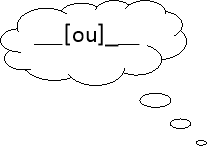



While-Listening:
1.Match the pairs:
1. London Bridge a) I have none
2. Silver and gold b) last so long
3. Needles and pin c) is falling down
4. Wood and clay d) bend and break
5. Stone e) wash away
2. Find the synonyms for the words and expressions in the song:
1. Falling down ________________
2. build ________________
3. have none ________________
4. break ________________
5. wash away ________________
6. strong ________________
3. Say if the sentences are true or false:
1. London Bridge is falling down.
2. Silver and gold will wash away.
3. Needles and pins will last so long.
4. Stone so strong.
5. Wood and clay will wash away.
6. Stone so strong will last so strong.
Post-Listening:
1. Listen to the song again and fill in missing words:
London Bridge is falling down
London Bridge is … ,
… , … .
London Bridge is … ,
My fair lady.
Build it up with silver and gold,
Silver and gold, Silver and gold.
Build it up with silver and gold,
My fair lady.
Gold and silver I …,
I …, I … .
Gold and silver I … ,
My fair lady.
Build it up with …,
…, … .
Build it up with …,
My fair lady.
… bend and break,
Bend and break, Bend and break.
… bend and break,
My fair lady.
Build it up with wood and clay,
Wood and clay, Wood and clay.
Build it up with wood and clay,
My fair lady.
Wood and clay will …,
…, ….
Wood and clay will …,
My fair lady.
Build it up with … so strong,
… so strong, … so strong.
Build it up with … so strong,
My fair lady.
… so strong will last so long,
Last so long, Last so long.
… so strong will …,
My fair lady.
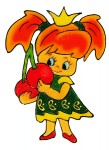

My Bonnie
My Bonnie lies over the ocean,
My Bonnie lies over the sea
My Bonnie lies over the ocean,
Oh bring back my Bonnie to me.
{Chorus:}
Bring back, bring back, oh bring back my Bonnie to me, to me:
Bring back, bring back, oh bring back my Bonnie to me.
Last night as I lay on my pillow,
Last night as I lay on my bed,
Last night as I lay on my pillow,
I dreamed that my Bonnie was dead.
{Chorus}
The winds have blown over the ocean,
The winds have blown over the sea,
The winds have blown over the ocean,
And brought back my Bonnie to me.
{Chorus}
My Bonnie lies over the ocean,
My Bonnie lies over the sea
My Bonnie lies over the ocean,
oh bring back my Bonnie to me.
Pre-Listening:
- Say after me:
Bring - приносити,
Pillow- подушка,
Over- через,
Ocean - океан,
Wind- вітер,
Blow- дути.
While-Listening:
- Listen to the song and give the short answers to the questions:
 1. Who lives over the ocean?
1. Who lives over the ocean?
2. Who lives over the sea?
3. Who lays on the pillow?
4. Who dreamed that Bonnie was dead?
5. Where did Bonnie lie?
6. What did the singer of the song dream of ?
Post-Listening:
1. Arrange the words in pairs of antonyms:
1. night a) river
2. lay b) day
3. die c) stand
4. ocean d) take
5. bring back e) live
2. Write three forms of irregular verbs to the first column and regular verbs to the second one:
|
Irregular verbs |
Regular verbs |
|
|
|
|
|
|
|
|
|
|
|
|
|
|
|
|
|
|
Post-Listening:
1. Listen to the song again and fill in the missing words:
My Bonnie … over the ocean,
My Bonnie lies over …
My Bonnie … over the ocean,
O bring back my Bonnie to me.
{Chorus:}
… back, bring …, O bring back my Bonnie to me, to me:
Bring …, bring back, O bring back my Bonnie to me.
Last night as I lay .. my pillow,
Last night as I … on my bed,
Last night as I … on my …,
I dreamed that my Bonnie was ….
{Chorus}
The winds have blown over the …,
The … have blown over the sea,
The … have blown over the …,
And … back my Bonnie to me.
{Chorus}
My Bonnie … over the ocean,
My Bonnie lies over the …
My Bonnie lies over the ocean,
O bring back my … to me.
“Happy New Year”
No more champagne
And the fireworks are through
Here we are, me and you
Feeling lost and feeling blue
It's the end of the party
And the morning seems so grey
So unlike yesterday
Now's the time for us to say...
Happy New year
Happy New year
May we all have a vision now and then
Of a world where every neighbour is a friend
Happy New year
Happy New year
May we all have our hopes, our will to try
If we don't we might as well lay down and die
You and I
Sometimes I see
How the brave new world arrives
And I see how it thrives
In the ashes of our lives
Oh yes, man is a fool
And he thinks he'll be okay
Dragging on, feet of clay
Never knowing he's astray
Keeps on going anyway...
Chorus

Seems to me now
That the dreams we had before
Are all dead, nothing more
Than confetti on the floor
It's the end of a decade
In another ten years time
Who can say what we'll find
What lies waiting down the line
In the end of eighty-nine...
Chorus.
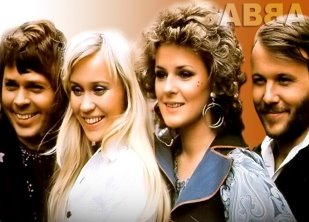
 1.Read about a Swedish pop music group and do the task:
1.Read about a Swedish pop music group and do the task:
ABBA was a Swedish pop music group formed in Stockholm in 1972. They became one of the most commercially successful acts in the history of popular music, and they topped the charts worldwide from 1972 to 1982. ABBA was also the first pop group from a non English-speaking country to enjoy consistent success in the charts of English-speaking countries, including the United Kingdom, the United States, Canada, Ireland, South Africa, Australia and New Zealand. They called themselves Björn & Benny, Agnetha & Anni-Frid.(ABBA), an acronym of their first names. ABBA was also the name of a Swedish canned fish company, which luckily agreed to lending their name to a pop group. The Eurovision Song Contest on April 6, 1974 turned out to be most famous moment in ABBA history, when the group won the international juries over with ‘Waterloo’. One of the most famous hits is the song “ Happy New Year”
2. Answer the questions:
1. Abba was an English pop music group, wasn`t it?
2. Where was the group formed in?
3. Why did they call themselves “ABBA”?
4. What contest did they win on April 6, 1974?
5. What were the most famous hits of the group?
Pre-Listening:
1. Say after me:
Firework феєрверк
Feeling почуття
Vision ілюзія
Neighbour сусід
Hopes сподівання
Lay down лягти
Thrive процвітати, досягати успіху Ashe зола, попіл
Dragging on тягнутись,
Astray заблукати, збитись зі шляху
2. There are some international words in this song.
Can you guess their meaning: champagne, confetti, decade.
3. Match the pairs:
1. No more a) New Year
2. fireworks b) of a party
3. the end c) a hope
4. Happy d) champagne
5. confetti e) are through
6. to have f) on the floor
4. Make up sentences and translate them:
1. the, seems, grey, And, so, morning.
2. for, say, It`s, us, time, to.
3. have, a all, We, vision.
4. we, all, are, have, dreams, before, dead, The.
5. It`s, end, of, the, decade, a.
While-Listening:
1. Listen to the song again and answer the questions:
1. What is this song about?
2. What does the singer feel?
3. What does he dream about?
4. How do you understand the phrase “feeling lost and feeling blue”?
 Post - Listening:
Post - Listening:
1. Fill in the gaps:
No more …
And the … are through
Here we are, me and you
Feeling lost and feeling …
It's the end of the party
And the morning seems so grey
So unlike …
Now's the … for us to say...
Happy New …
Happy New …
May we all have a … now and then
Of a world where every neighbour is a friend
Happy …
Happy …
May we all have our …, our will to try
If we don't we might as well lay down and die
You and I
… I see
How the brave new world arrives
And I see how it …
In the … of our lives
Oh yes, man is a fool
And he thinks he'll be okay
Dragging on, feet of clay
Never knowing he's …
Keeps on going anyway...
Chorus
Seems to me now
That the … we had before
Are all dead, nothing more
Than … on the floor
It's the end of a …
 In another ten years time
In another ten years time
Who can say what we'll find
What lies waiting down the line
In the end of eighty-nine...
Reference
1. Іноземні мови №2/2009р. «Використання пісенного текстового матеріалу на уроках англійської мови».
2. English №36 (84)/2001р. «Пісенний, поетичний та фольклорний матеріал на уроці англійської мови»
3. Англійська мова та література №12(58)/2004р. «Вивчення іноземної мови через пісню та музику»
4. Мініна М.Л. «Методика застосування автентичної англійської пісні»
5. Internet Resources
Відомості про авторів

Подзерка Наталя Василівна,
вчитель англійської мови,
спеціаліст І категорії,
ЗОШ №13 м. Соледар.

Тонконог Юлія Миколаївна,
вчитель англійської мови,
спеціаліст ІІ категорії,
ЗОШ №13 м. Соледар.

Кашеварова Олена Віталіївна,
вчитель англійської мови,
спеціаліст ІІ категорії,
ЗОШ №13 м. Соледар.


про публікацію авторської розробки
Додати розробку

